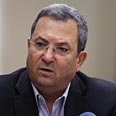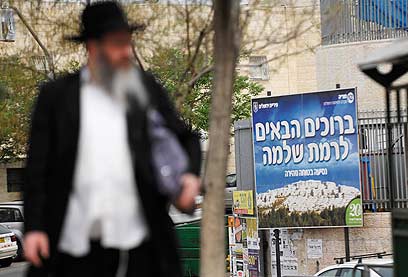

PM: Building in Jerusalem is like building in Tel Aviv
Several hours before leaving for Washington, Netanyahu clarifies that his message to American administration will be sharp and clear: 'Our policy on Jerusalem is like the policy in the past 42 years.' Defense Minister Barak hopes 'this week will put Israel on the course of negotiations'
"As far as we are concerned, building in Jerusalem is like building in Tel Aviv, and we have made this clear to the Americans.
The prime minister said he planned to raise several issues during his upcoming visit to Washington: Peace, security, Iran and Jerusalem.
"We will be able to raise any issue for negotiation, and have clarified that we will be able to do this better in direct negotiations. Only by sitting this way and talking will we be able to come to real negotiations," Netanyahu said.

Disputed Ramat Shlomo neighborhood in Jerusalem (Photo: Reuters)
Defense Minister Ehud Barak met earlier with Quartet envoy to the Middle East Tony Blair. "We are at the beginning of a week which I hope will lead to a course of peace negotiations with the Palestinians," Barak said after the meeting.
"This evening's trip us very important," he added. "I hope that in our actions we have supported putting Israel, finally, on a course of serious and thorough negotiations with the Palestinians."
Core issues on negotiating table
The price Israel would have to pay following the crisis with the US was reported Saturday. Ahead of Netanyahu's departure to Washington on Sunday evening for an American Israel Public Affairs Committee (AIPAC) meeting in Washington, Israel and the US agreed that the core issues would be included in indirect talks with the Palestinians, construction in east Jerusalem will be delayed and Israel will ease the blockade on the Gaza Strip.
The agreement was reached following the diplomatic crisis, which broke out following an a plan to build 1,600 new housing units in the Jerusalem neighborhood of Ramat Shlomo, which was announced during US Vice President Joe Biden's visit to Israel.
Israel's original request was to discuss formalities only ahead of direct negotiations, while the Palestinians wanted to discuss the core issues. The Biden crisis worked in favor of the Palestinians. According to explicit remarks made by US Secretary of State Hillary Clinton over the weekend, the core issues will be discussed.
The American administration has been pressuring Israel recently to start discussing the borders as the first core issue. The argument was that when the borders are agreed on, there will be no building freeze problem.
US Special Envoy George Mitchell will be arriving in Jerusalem on Sunday and will meet with Netanyahu. The prime minister will inform Mitchell, and possibly the Israeli public as well, of the series of gestures he agreed to in order to facilitate the proximity talks with the Palestinians.
The gestures will apparently include much stricter supervision by the PM himself over east Jerusalem construction. According to senior government ministers, this would mean a slowdown in Jewish construction - both government-funded and private - beyond the Green Line in Jerusalem. The gestures will also include several steps meant to bolster Palestinian President Mahmoud Abbas, such as a prisoner release upon the start of the negotiations.
Before leaving for Washington, Netanyahu is also expected to meet with UN Secretary-General Ban Ki-moon for discussions on the Jerusalem building crisis and the indirect talks with the Palestinians.
Over the weekend, the prime minister worked on drafting his speech at the AIPAC Conference next week, where he will arrive with Ministers Ehud Barak and Uzi Landau. Opposition Chairman Tzipi Livni is also expected to address the pro-Israel lobby.
Netanyahu's aides said that the speech will be "powerful and significant" and will likely deal with Israel-US ties in an effort to allay the recent tensions as result of Israel's construction announcement in east Jerusalem during President Joe Biden's visit.
In Washington, Netanyahu is scheduled to meet with Secretary of Defense Robert Gates, and possibly with Secretary of State Hillary Clinton and President Barack Obama.















